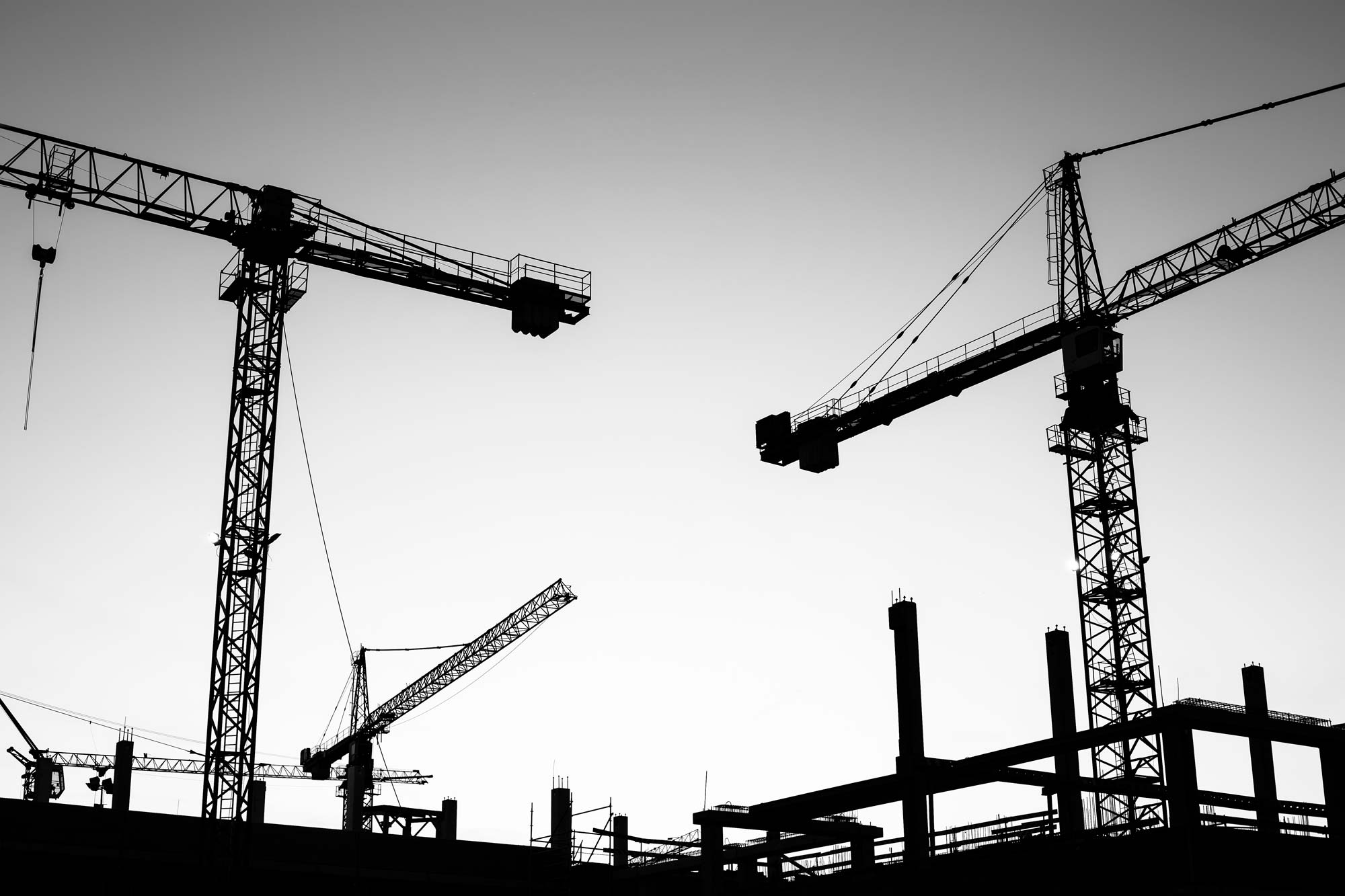-
Home
- Ground Up Construction
- Real Estate Investing
- Guide to Commercial...
Guide to Commercial Real Estate Construction Loans


Whether you found the perfect location for your new mixed-use high rise or you’re sinking your teeth in possible lots for a new apartment complex, finding the funding may be the only thing holding you back.
The good news is that commercial real estate construction loans can help you finance your project as a business owner, investor, entrepreneur, or the like. In fact, the market for commercial construction is growing. In 2020, despite the effects of COVID, commercial construction loans issued by banks alone increased 9.4% from the previous year.
However, there’s a lot to consider before building commercial real estate. You should know how commercial construction loans work, what the typical commercial construction loan rates are, real estate development financing options, and more.
Luckily for you, we cover all of that – and then some – below.
Table of Contents:
- What Is a Construction Loan?
- How Do Commercial Construction Loans Work?
- Requirements for a Construction Loan
- Commercial Construction Loans Rates
- Types of Construction Loan Collateral
- Commercial Real Estate Construction Loans FAQ
What Is a Construction Loan?
Construction loans provide short-term financing where the construction cost of a building project may otherwise be too expensive to pay for in a lump sum. Many traditional and private lenders offer construction loans with interest rates between five and 18% on permitted or permit-ready lots. Typical construction loan terms can range anywhere from 12 – 18 months.
Revolution Realty Capital offers ground-up construction loans between $500,000 and $5 million for non-owner-occupied single-family properties, townhomes, multi-family, and mixed-use properties. Rates start at 8.49% and, depending on the appraisal process, can close within 10 – 20 days – more than two times quicker than many traditional lenders.
Lorem ispum dolor sit umit

Lorem ipsum dolor sit amet, consectetur adipiscing elit. Proin interdum dolor a ullamcorper molestie. Vivamus in justo velit. Aliquam vehicula massa et venenatis placerat.
How Do Commercial Construction Loans Work?
Unlike a traditional mortgage loan, a commercial building loan is paid in several different stages. During the construction process, you only pay interest on the amount you’ve received, rather than paying interest on the full amount of the loan. Payments on the principal don’t begin until the construction is complete.
For example, if you received $100,000 from your lender for the first phase of the project, you’ll only pay interest on that $100,000. Once you’ve received the funds for and begun the second stage of the project, you’ll pay interest on the $100,000 from the first stage, as well as the interest on funds received for the second phase.
These steps or milestones are established before the project begins and the funding is released. Once you’ve reached a milestone in the project plan and an inspector has reviewed the work, your lender will then make the next loan installment.
To further understand the commercial real estate construction loan process, review the steps below:
- Contact a lender: In business and life, time is money. Finding the right lender who can provide a swift closing period and competitive rates is key to profiting from your construction project.
- Commercial construction loan underwriting: Underwriters for commercial real estate construction loans look at common financial ratios to determine if lending the money for this project will be profitable for all involved. They typically evaluate the loan-to-cost ratio (LTC), loan-to-value ratio (LTV), debt service coverage ratio, profit ratio, and net-worth-to-loan-size ratio.
- Lender commitment letter and approval: Upon approval, the lender will issue a formal letter of commitment. This legally binding document specifies the total loan amount, the purpose of the funds, repayment expectations, and all other requirements.
- Borrower is put on a draw schedule: The draw schedule is similar to a project plan. Major steps in the construction process are outlined with an estimate of their costs. Once the first step is complete, the lender will release the funds for the second step, and so on.
- Inspection during construction: Once a step in the draw schedule is complete, an inspector will ensure everything is in working order and nothing is missing. Depending on how soon an inspector is available, this can add time to the project – especially in strong real estate markets.
- Paying off the loan: Your initial construction loan may be transferred to a mortgage loan once construction is complete. At this point, you’ll begin paying both the principal amount and the interest. If you have a construction-to-permanent loan, your loan will automatically convert to a typical monthly payment on a mortgage. Construction-to-permanent loans also don’t require additional closing costs – one benefit of this construction financing option.
Requirements for a Construction Loan
Before applying for commercial real estate construction loans, ensure you’ll qualify for an amount that will cover the costs of your project. As previously mentioned, time is money, and applying for commercial loans takes time. Hard money commercial construction loans can be higher-risk, so lenders want to ensure you’ll be a low-risk borrower.
To do this, they will often pull your credit score and your business’s financial information, and may even ask for personal income verification. For ground up construction loans, Revolution Realty Capital doesn’t include income requirements or verification in the approval process.
Commercial construction loan requirements include:
- Detailed description of the project
- Permit-ready lot
- High personal credit score
- Low debt-to-income ratio
- Adequate down payment and overall budget
- Specified appraiser
- Income tax documents
- Business profit and loss statement
- Taesent tincidunt vehicula ante, sed tempus libero vulputate.
- Lorem ipsum dolor sit amet, consectetur adipiscing elit.
- Taesent tincidunt vehicula ante, sed tempus libero vulputate.
- Lorem ipsum dolor sit amet, consectetur adipiscing elit.

Lorem ipsum dolor sit amet, consectetur adipiscing elit. Proin interdum dolor a ullamcorper molestie. Vivamus in justo velit. Aliquam vehicula massa et venenatis placerat.

Lorem ipsum dolor sit amet, consectetur adipiscing elit. Proin interdum dolor a ullamcorper molestie. Vivamus in justo velit. Aliquam vehicula massa et venenatis placerat.
Commercial Construction Loans Rates
Construction loans for investment properties often have higher interest rates than traditional mortgages. It’s common to find these commercial real estate rates between five to 18%. The better your credit history, business finances, and experience, the lower your interest rate will be.
At Revolution Realty Capital, you can secure a ground-up construction loan with a rate as low as 8.49%, funding up to 85% loan-to-cost (LTC), and 75% after-repair-value (ARV).
Types of Construction Loan Collateral
Since there’s no building to use as collateral in hard money commercial construction loans, you may be asking, “Can land be used as collateral for a construction loan?” or “How does using land as collateral work?”
Collateral is often required for loans as protection in case you fail to make payments. Construction loan collateral can come in the form of owned land or existing property.
In some cases, you can secure a loan against the equity in these assets. This loan can then assist with the down payment of your construction loan. The down payment amount will be determined using an LTC calculation.
Using land as collateral for a construction loan works best if you own the land outright. If you have a loan on the land, many lenders can fold the existing land loan into your construction loan. However, land in this case isn’t strong collateral and might drive up your interest rate or increase other aspects of the loan.
Land Loan
Land loans are strictly for land purchases. If you don’t plan to build anything on the land soon, this may be a good option for you.
Taesent tincidunt
vehicula ante, sed tempus libero vulputate.

Land Loan vs. Construction Loan:
Land loans are strictly for land purchases. If you don’t plan to build anything on the land soon, this may be a good option for you. However, if you plan to start building immediately, a construction loan that incorporates the purchase of the land would be a better choice.
- Taesent tincidunt vehicula ante, sed tempus libero vulputate.
- Lorem ipsum dolor sit amet, consectetur adipiscing elit.
- Lorem ipsum dolor sit amet, consectetur adipiscing elit.
- Taesent tincidunt vehicula ante, sed tempus libero vulputate.

Proin interdum dolor a ullamcorper molestie. Vivamus in justo velit. Aliquam vehicula massa et venenatis placerat. In hac habitasse platea dictumst. Maecenas scelerisque ipsum et mauris aliquam, eget rhoncus enim facilisis. Praesent tincidunt vehicula ante, sed tempus libero vulputate at. Proin sed erat neque.”

Proin interdum dolor a ullamcorper molestie. Vivamus in justo velit. Aliquam vehicula massa et venenatis placerat. In hac habitasse platea dictumst. Maecenas scelerisque ipsum et mauris aliquam, eget rhoncus enim facilisis. Praesent tincidunt vehicula ante, sed tempus libero vulputate at. Proin sed erat neque.”
Daniel William
Co-Foundet Acme Corp
Depending on your lender, you may also be required to have both a contingency reserve and an interest reserve. These reserves act as additional protection for the lender if the project goes over the allocated budget or any unforeseen issues arise.
| Collateral for Real Estate Construction Loans |
|---|
| Land Value – Owning the land you plan to build on reduces the lender’s risk of losing their loaned funds if something in the project goes south. |
| Existing Property – If you don’t own the land you’re building on, using a property you own as collateral can also be acceptable to many lenders. |
| Contingency Reserve – Many lenders request you have a 5–10% contingency reserve to act as a safety net if the project goes over budget. |
| Interest Reserve – This account can hold the total interest over the life of the loan instead of the borrower having to make monthly payments. |
Commercial Real Estate Construction Loans FAQ
Below are frequently asked questions related to commercial real estate construction loans. If you’re still unsure about commercial construction loan requirements or how you can start funding your next project, continue reading to find your answer.
What Do You Need To Qualify for a Construction Loan?
To qualify for a construction loan, you’ll need proof of being a low-risk borrower through a high personal credit score and a low debt-to-income ratio for your business. You’ll also need an appropriately-sized down payment, a qualified builder, an appraisal of your proposed project, tax documents, and a profit and loss statement.
How Can I Find Construction Lenders Near Me?
You can find most construction lenders near you by doing a Google search or by asking around about some of the better options in your location. Revolution Realty Capital is available in 42 states and most notably offers hard money commercial construction loans in Arizona, Texas, and Florida.
Can Land Be Used as Collateral for a Construction Loan?
In short, yes. Owning the land outright is the best-case scenario. However, if you have an existing loan on the land, your lender may increase other requirements to protect the loaned funds.
Commercial real estate investment loans are one of the best methods for business owners and investors to fund commercial property developments. When done right, these developments can increase cash flow and investment portfolios.
Now that you understand how commercial construction loans work, it’s time to shop around to find the right one for you or your business.

Lorem ipsum dolor sit amet, consectetur adipiscing elit. Proin interdum dolor a ullamcorper molestie. Vivamus in justo velit. Aliquam vehicula massa et venenatis placerat.



